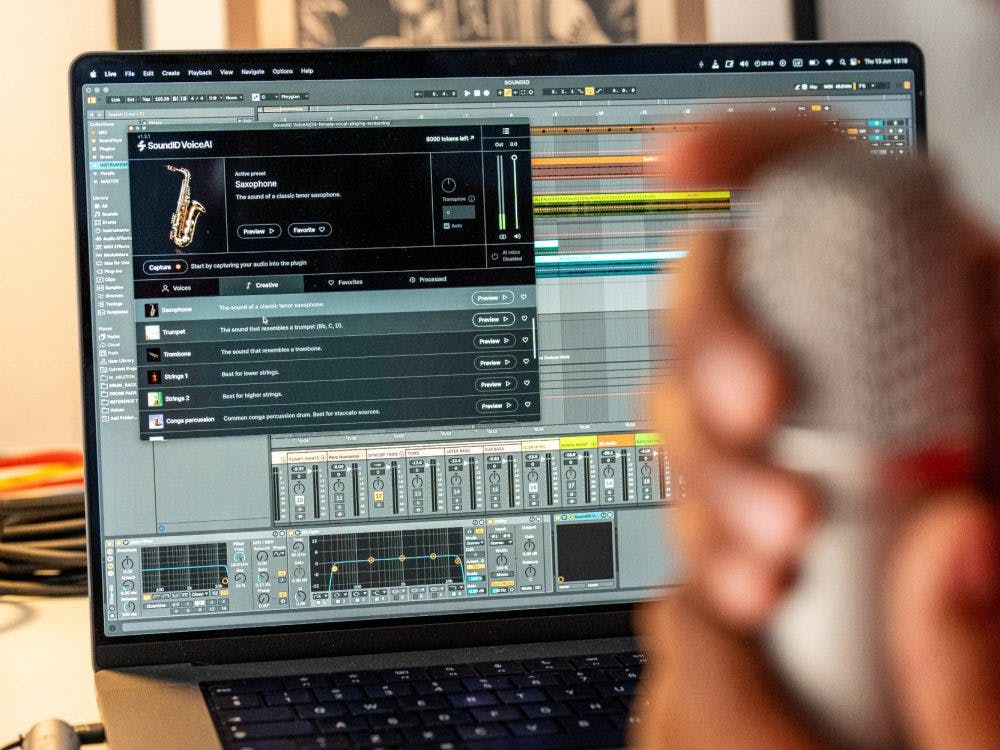Artificial Intelligence has revolutionised vocal processing by bringing unprecedented automation, precision, and creative possibilities to music production workflows. AI-powered vocal processing tools analyse audio signals using complex algorithms to enhance quality, correct imperfections, and generate entirely new vocal effects that would be difficult or impossible to achieve manually. The advantages include significant time savings, reduced technical barriers for creators, consistent high-quality results, and expanded creative possibilities through voice transformation and style transfer—making professional-grade vocal production accessible to creators across all skill levels.
Understanding AI in vocal processing
AI vocal processing represents a fundamental shift in how music creators approach their craft. Unlike traditional vocal plugins that require manual adjustment of numerous parameters, AI-powered solutions can intelligently analyse audio input and make decisions based on sophisticated machine learning models trained on thousands of professional recordings.
This technology leverages neural networks to understand the nuances of human voice, including pitch, timbre, articulation, and emotional expression. Modern AI systems can identify vocal characteristics that might take years for human engineers to master, applying appropriate processing automatically.
Recent advancements have moved beyond basic correction tools towards creative voice transformation capabilities. AI can now modify vocals to sound like different singers, instruments, or entirely new sonic textures—expanding the creative palette available to producers and artists.
What are the key benefits of AI vocal processing in music production?
The integration of AI into vocal processing delivers several transformative benefits that are changing how creators approach their projects. Perhaps the most immediate advantage is the dramatic time efficiency AI brings to workflow. Tasks that once required hours of meticulous editing—like tuning, timing correction, and de-essing—can now be accomplished in minutes with intelligent algorithms handling the heavy lifting.
AI also democratises professional-quality vocal production by lowering technical barriers. Producers without extensive engineering experience can achieve polished results through intuitive interfaces that mask complex processing under the hood. This accessibility has opened doors for independent artists and creators working without large studio budgets.
Consistency represents another significant benefit. AI tools deliver reliable results across entire projects, maintaining a coherent sound that can be challenging to achieve through manual processing alone. This consistency extends to batch processing capabilities, allowing creators to apply the same vocal treatment across multiple tracks effortlessly.
How does AI improve vocal quality and clarity?
AI algorithms excel at enhancing vocal quality by addressing technical issues with remarkable precision. At the foundation, these tools employ intelligent noise reduction that can distinguish between wanted vocal content and unwanted noise, preserving the natural character of performances while eliminating distractions.
Pitch correction in AI systems goes beyond traditional auto-tuning by understanding musical context and preserving expressiveness. Rather than applying rigid correction, modern AI can identify intentional vocal inflections and preserve them while fixing genuinely problematic notes.
Dynamic processing benefits similarly from AI’s contextual awareness. Intelligent compression and EQ can adapt to different sections of a performance, applying appropriate treatment to loud choruses versus quiet verses without manual automation. This dynamic adaptation ensures vocals sit perfectly in mixes across varying intensity levels.
For articulation challenges, AI can enhance clarity by identifying and emphasising consonants or smoothing harsh sibilance, making lyrics more intelligible without creating artificial-sounding results.
What creative possibilities does AI open up for vocal effects?
AI voice transformation represents one of the most exciting frontiers in music production, enabling creators to explore entirely new sonic territories. Voice morphing technology can transform vocals to sound like different singers, cross genders, age ranges, or even blend multiple vocal characters to create unique hybrids impossible with conventional tools.
Style transfer—a technique borrowed from visual AI—allows producers to apply the characteristics of one vocal style to another recording. A clean studio vocal can take on the tonal qualities of vintage recordings or adopt the stylistic elements of different genres without losing lyrics or emotional intent.
AI harmonisation has revolutionised backing vocal production, generating realistic harmonies from a single vocal take. These systems understand musical theory to create appropriate harmony parts that complement the original performance with natural variations in timing and expression.
Perhaps most groundbreaking are vocal-to-instrument transformations, where AI can convert sung melodies into convincing instrument sounds—turning hummed ideas into virtual guitar solos, brass sections, or synthesiser leads with remarkable authenticity.
How to choose the right AI vocal processing solution?
Selecting the optimal AI vocal processing tool requires evaluating several factors to match your specific production needs. The processing quality should be your primary consideration—listen for natural-sounding results that enhance without introducing digital artifacts, particularly with challenging vocal material.
Workflow integration matters significantly for professional environments. The best tools offer seamless compatibility with popular DAWs and flexible options for both real-time monitoring and offline processing to accommodate different working styles.
Consider the processing power requirements and whether cloud-based or local processing better suits your setup. Cloud solutions offer powerful processing without taxing your computer but require reliable internet connectivity, while local processing provides lower latency for real-time applications.
For those seeking comprehensive vocal enhancement capabilities, our SoundID VoiceAI represents a solution trusted by professionals across the industry. It combines sophisticated AI algorithms with an intuitive interface, offering both creative transformation tools and technical enhancement features in a single package.
Key takeaways on the future of AI in vocal processing
The integration of AI in vocal processing continues to transform music production by combining technical excellence with unprecedented creative flexibility. As these technologies evolve, we’re seeing increasingly natural-sounding results alongside more innovative transformation capabilities—expanding what’s possible for creators at all levels.
Our SoundID VoiceAI exemplifies the cutting edge of this technology, offering musicians and producers a powerful toolset for enhancing vocals with precision while exploring creative voice transformation possibilities. With both local and cloud processing options, it provides flexible workflows for projects of any scale. Whether you’re correcting pitch issues, transforming vocal character, or creating entirely new sonic textures, AI-powered tools like SoundID VoiceAI are reshaping what’s possible in modern vocal production—bridging technical hurdles to help creators focus on artistic expression instead of tedious editing tasks.



